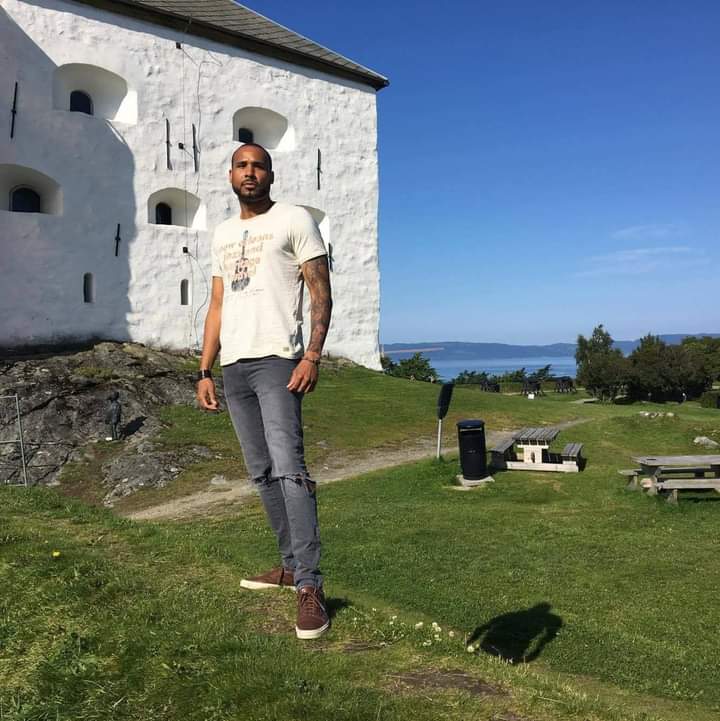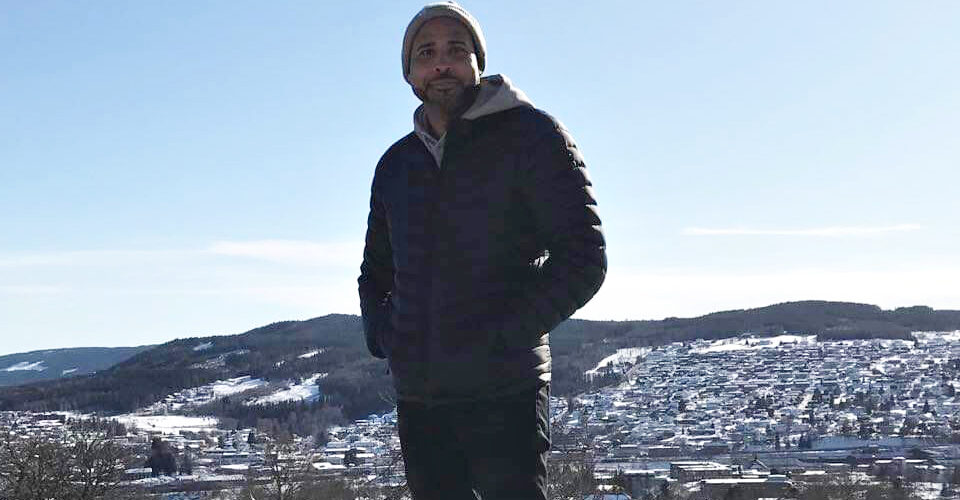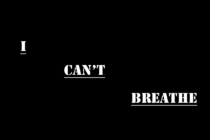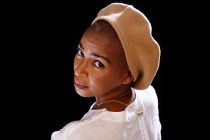by ERICK TAYLOR WOODBY
“You talk about your activism,” I ask Robert Gillan, a black American expatriate living in Oslo, Norway. “Do you think that’s uniquely American, but black American? Being very passionate about wanting to fight for the causes?”
Robert appears on screen for our video chat wearing a black t-shirt emblazoned with a black and white version of the American flag. The faces of civil rights leaders Dr. Martin Luther King, Jr. and Malcolm X are in front of it. It’s my sign that he isn’t apprehensive about celebrating who he is as a black citizen in Scandinavia.
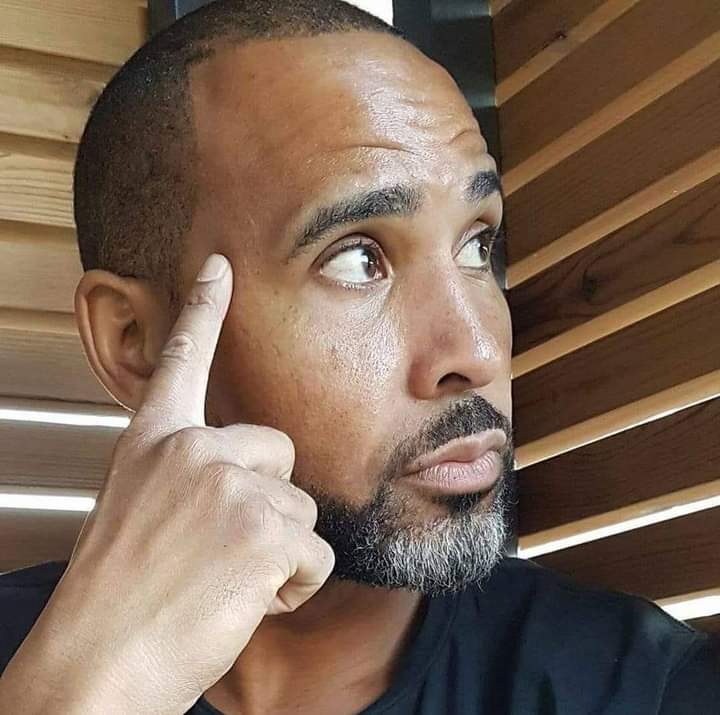
“We are more boisterous with our voice,”
Robert replies. “We’re so open, unlike the Scandinavians, where they hold back on their opinion. You’ll always find a group of supporters in America on almost any opinion that you have, no matter how divisive it is. The descendants have a loud voice. Compared to descendants anywhere else.”
Born in Oklahoma and raised in a military family where his father and maternal grandfather were in the United States Army, Robert himself is a U.S. Air Force veteran. His scholastic education includes attending Langston University, Oklahoma’s only historically black college or university (HBCU).
Arriving in Norway in 2012 through his marriage to his Norwegian wife, Robert discloses that although he had the experience of living in different places while in the military, he’s continuing to adjust to the ways of his adopted country. One that includes working in education, a position he believes helps him better understand how children are raised. “I learn about Norwegian society through that,” he says.
“If I picked any European country, this is one of the best. I started finding out how good it was after getting here,” Robert states. “But still, to this day, I’m trying to find myself, rediscover myself. I’ve found new things to do where I can be involved with certain things as far as the black expats and the diaspora.”
No longer married, Robert remains in Norway, helping to raise his son. After several years as a permanent resident, Robert went through the requirements needed to become a dual American and Norwegian citizen. With this, he has the same rights and obligations as other Norwegians and is entitled to two passports.
Our talk continues with Robert citing the intricacies of life as a black person in the United States. In that, race is at the forefront of America’s consciousness. He chuckles. “We know how it is to be in certain situations. And we can pinpoint and pick out certain things, like everyday racism and its subtleties.”
Before moving to Norway, Robert acknowledges he wasn’t as vocal about his knowledge and experiences regarding the social injustices of racism, xenophobia, and sexism. He admits to being quiet on these matters during his first couple of years in the country.
“It’s funny how it kind of started.”
Adjusting the microphone on his headset, Robert reveals that his frustration a few years prior surfaced when the American media began reporting on the overt racism resurfacing throughout the U.S. “I just felt like there’s nothing I can do with all these things going on with police brutality. Before George Floyd and all of that.”
During this time, he continued to share his feelings and concerns with those around him in Norway. Finally, his then-wife suggested Robert bring his message to the public by creating a YouTube channel. Stroking his chin, Robert’s eyes leave me to look upward. “I started to think about it. I’ve always been into history. Starting from the fifth grade. So I decided to give it a crack.”
DaRealNordicBlack launched onto YouTube in the summer of 2014. With Robert’s initial foray into social media, he confesses he didn’t take it seriously. Then he researched and talked about certain persons of African descent living in Scandinavia and other parts of the world. One such individual was Runoku Rashidi, an American historian, essayist, author, and public lecturer.
“He’s a pillar in the black community,” Robert says of Rashidi, who died in August 2021. “We actually had a dialog, him and me. Because I wanted to interview him.” Robert pauses. “I believe I would have.”
But what encouraged Robert to take DaRealNordicBlack more seriously was receiving a message from northern Norway near the Arctic Circle. A teen who revealed that he’d never heard of the figures Robert discussed. “That’s what hit me deeply. Even to this very day.”
With his YouTube channel, Robert’s goal is to celebrate people of color. Because of the racism and xenophobia that ethnic minorities can experience, he believes it is vital to highlight achievements that go beyond stereotypes. Celebrating those who set aside societal limitations for authentic expression.
“Scandinavians are not known for trying to stick out,”
Robert declares. “But if you’re a black person, you ain’t ever going to be able to fully immerse into the culture. You will stick out. You just gotta kind of accept that.”
Because of Robert’s experience as a black American, one that includes a lack of knowledge of the African history that dissolved during the transatlantic slave trade, he encourages ethnic minorities in Norway to maintain their cultural heritages. “Whether it’s Somalia, Eritrea, Ethiopia, or other countries, sometimes some parents try their best to assimilate. Which is a good thing. But sometimes, they don’t pass down that history.”
As an activist, Robert aims to educate all citizens on the realities of racial discrimination and “how it harms all of us in the larger context of humanity.” He acknowledges the positives that make life better in Norway. However, Robert doesn’t shy away from subject matters that may be uncomfortable for others to speak about. Admitting that this can include other black Americans living in Norway.
“They have different Americans out here. And I’m kind of the more outspoken, unapologetic type. To the point that I even ruffle a few feathers of my own cultural background,” he adds.
The Blue Eyes/Brown Eyes Exercise
Through topics and conversations on the DaRealNordicBlack, Robert and his guests share their knowledge and academic and professional expertise on racism, sexism, and other issues. Most of the guests, who include civil rights activists, authors, historians, and scholars, have been people who’ve inspired him.
One such person is American Jane Elliott, an internationally known teacher, lecturer, and diversity trainer. In response to the April 4, 1968 assassination of Dr. Martin Luther King, Jr., Elliott developed the “Blue Eyes/Brown Eyes Exercise,” where she places participants in groups according to eye color. And labels them as inferior or superior.
Starting his YouTube channel, sharing his thoughts, and seeing the responses he’s receiving from guests like Jane Elliott, Norwegian literary researcher Helge Rønning, American historian, writer, and activist Roxanne Dunbar-Ortiz, and others motivate Robert to continue on his journey of self-discovery through activism.
“I shot them emails and messages. And I was so shocked that they took me on,” Robert confesses. “Because my channel is not so big.”
Robert hopes that what he’s doing, with sharing his message and using his platform, will continue to educate, inspire and galvanize others to share who they are in a way that positively affects their communities, their cities, and their countries.
Robert jokes. “For a black person, especially a black American, I think I went pretty far for a guy rolling out of bed speaking his opinion.
Somebody’s listening.”
“I’m not a master student. At the same time, I think I can run circles around certain professors when it comes to ‘our’ story. I think I’ve read more books than certain ones.”
Robert shares that he’s also committed to bringing to the forefront the challenges women and the LGBTQ community face. “I try to be involved with issues when I can.”
Learn more about Robert, his message, and his YouTube channel. His Facebook handle is robert.gillan.100. And he’s on YouTube as DaRealNordicBlack.
